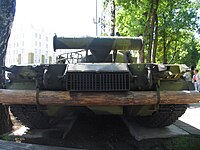
Summary
An unditching beam is a device that is used to aid in the recovery of armoured fighting vehicles when they become bogged or "ditched". The device is a beam that is attached to the continuous tracks that provides additional traction for the vehicle to extricate itself from a ditch or from boggy conditions.



The unditching beam was first introduced into service during the First World War with the British Mark IV tank.[1] It is believed the device was designed by Philip Johnson who was serving as an engineering officer at the British Army's depot at Érin, originally the device weighed one-half long ton (0.51 t) and was constructed of a solid beam of oak with two large steel plates bolted to two sides to provide protection.[2] When not in use it was stowed on two rails mounted on the roof of the tank that ran the entire length of the vehicle, and when employed the beam was chained to the tank's tracks, giving the vehicle something firm to drive over.[2][3]
Unditching beams remain a commonly carried standard ancillary on a number of Russian produced armoured fighting vehicles.[4]
See also edit
References edit
Citations edit
- ^ Foss (2002), p. 16.
- ^ a b Fletcher (2016).
- ^ Moore (2017).
- ^ Janes, "RUSSIAN T‐80U MBT".
Bibliography edit
- Fletcher, David (2016). British Battle Tanks: World War I to 1939. London: Osprey Publishing. ISBN 9781472817570.
- Foss, Christopher F., ed. (2002). The encyclopedia of tanks & armoured fighting vehicles. London: Amber Books. ISBN 978-1905704-44-6.
- Janes, Land Warfare Platforms: Armoured Fighting Vehicles, Coulsdon, Surrey: Jane's Group UK Limited.
- Moore, Craig (2017). Tank Hunter: World War I. Stroud: The History Press. ISBN 9780750986595.


